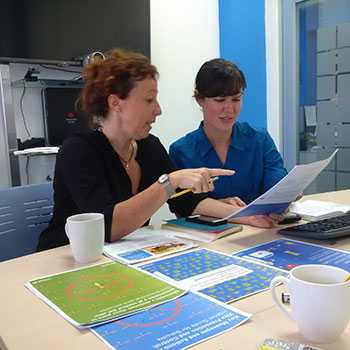A Rapid Responder Engages a Community to Fight Zika
Tasha Stehling-Ariza, CDC

Tasha (right) at work in Panama (Source: Tasha Stehling-Ariza, CDC)
When I tell people I’m an epidemiologist, their faces often go blank. Luckily, explaining complicated ideas is part of my job.
In fact, an epidemiologist has many jobs, and one of them is making sense of complex and evolving situations. On my most recent deployment to Panama with CDC’s Global Rapid Response Team, my ability to explain the unknown became a critical skill. I arrived on the scene just as the Zika outbreak was taking hold.
People in the community had questions: What is Zika? How do I prevent it? If I’m pregnant, how can I keep my baby safe?
Digging for answers proved to be more difficult than we expected, because not much was known about the virus. My team and I combed through the science to piece together facts about Zika virus, the mosquitoes that transmit it, and Zika outbreaks that had occurred in other parts of the world.
We then developed materials to get the message out. However, we soon encountered another obstacle: giving people information about Zika wasn’t going to be enough to beat it. Although people understood how to help prevent Zika, they didn’t see it as a serious threat. They didn’t understand why they should bother to wear insect repellent or clean up standing water in their neighborhoods.
For many, Zika can be all too easy to ignore. Many people infected with the virus won’t have symptoms or will have only mild symptoms. But for pregnant women, the effects can be devastating. Zika virus infection during pregnancy can cause microcephaly, a birth defect where a baby’s head is smaller than expected when compared to babies of the same sex and age. Zika infection can also lead to other severe fetal brain defects.
One pregnant woman, afraid for her unborn child, urged her neighbors to help clean up trash piles and other places where Zika-carrying mosquitoes can hide. She was counting on everyone around her, knowing that the health of her baby was in the hands of her community.
Influencing the way people behave is not easy, but with open communication, ongoing education, and strong community support, change is possible. By encouraging everyone to care about fighting Zika – pregnant or not – the potential to stop the virus is within reach. As every rapid responder knows, even in situations where we don’t have all the answers, we can still make a big difference.
"By encouraging everyone to care about fighting Zika – pregnant or not – the potential to stop the virus is within reach."
Tasha Stehling-Ariza (Epidemiologist, CDC Global Rapid Response Team)
- Page last reviewed: August 15, 2016
- Page last updated: August 15, 2016
- Content source:


 ShareCompartir
ShareCompartir